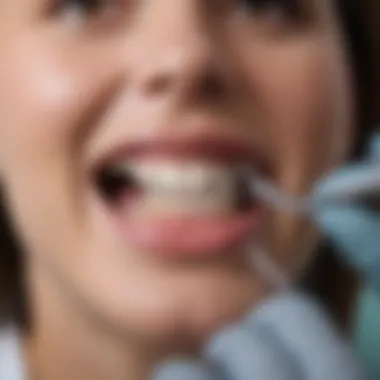Effective Strategies for Banishing Bad Breath and Boosting Confidence


Insider Beauty Tips
Bad breath is a common concern that can significantly impact one's confidence and social interactions. It is crucial to address the root causes of bad breath effectively to maintain optimal oral hygiene. From poor dental habits to underlying health issues, various factors can contribute to halitosis. Identifying these triggers is the first step towards combating bad breath and achieving fresh breath that boosts self-assurance.
Understanding the Causes of Bad Breath
Halitosis, or bad breath, can stem from a range of sources, such as poor oral hygiene, food particles trapped between teeth, dry mouth, gum disease, or certain medical conditions. It is essential to pinpoint the specific cause of bad breath to tailor appropriate treatment and preventive measures. Consulting with a dentist can help in diagnosing the underlying issues and devising a personalized oral care plan.
Practical Solutions and Oral Hygiene Tips
Combatting bad breath requires a multi-faceted approach that includes thorough brushing and flossing, using antibacterial mouthwash, staying hydrated, and scraping the tongue to remove bacteria buildup. Additionally, incorporating breath-freshening foods like parsley or apples into your diet can help neutralize odors. Regular dental check-ups and professional cleanings play a vital role in maintaining oral health and addressing potential bad breath triggers.
Understanding Bad Breath
In this comprehensive guide on combatting bad breath, a crucial part is understanding the underlying causes and implications of halitosis. By delving into the origins of bad breath, individuals can pinpoint specific triggers and take targeted actions to rectify the issue effectively. This section aims to shed light on the multifaceted nature of bad breath, emphasizing the significance of a holistic approach towards oral hygiene. From examining poor oral hygiene to exploring the impact of medical conditions, a nuanced understanding of bad breath is indispensable for those striving to achieve enduring oral freshness.
Causes of Bad Breath
- Poor Oral Hygiene: At the crux of halitosis lies inadequate oral hygiene practices. Neglecting to brush and floss regularly can pave the way for bacterial proliferation in the mouth, leading to offensive odors. Understanding the effects of poor oral hygiene is pivotal in grasping the fundamental reasons behind persistent bad breath. Despite its prevalence, poor oral hygiene can be rectified through consistent and thorough dental care routines.
- Bacterial Build-Up: The accumulation of bacteria in the oral cavity is a primary instigator of bad breath. These bacteria thrive on residual food particles, releasing foul-smelling byproducts that contribute to halitosis. Addressing bacterial build-up involves not only surface-level cleaning but also cultivating a balanced oral microbiome to mitigate odor-causing agents effectively.
- Dry Mouth: Saliva plays a crucial role in rinsing away food debris and maintaining oral p H levels. A dry mouth devoid of sufficient saliva facilitates the growth of odor-producing bacteria, exacerbating bad breath. Recognizing the impact of xerostomia in fostering halitosis underscores the importance of promoting saliva production through hydration and proper oral care.
- Dietary Factors: The foods we consume can significantly influence the freshness of our breath. Certain foods, such as garlic and onions, contain volatile compounds that linger in the mouth and lungs, emitting unpleasant odors. By understanding the connection between dietary choices and bad breath, individuals can proactively select breath-friendly options to combat halitosis.
- Medical Conditions: Underlying medical conditions like gastroesophageal reflux disease (GERD) and sinus infections can manifest as chronic bad breath. Addressing medical contributors to halitosis requires a thorough evaluation by healthcare professionals to ascertain and treat the root cause effectively.
Impact of Bad Breath


- Social Implications: The social repercussions of bad breath can be profound, affecting individual interactions and self-confidence. Confronting the social stigmas associated with halitosis necessitates open communication and proactive steps towards freshening one's breath. Heightened awareness of social implications can motivate individuals to prioritize oral hygiene for improved interpersonal relationships.
- Low Self-Esteem: Chronic bad breath can erode self-esteem and self-image, fostering feelings of inadequacy. Understanding the psychological impact of halitosis on self-perception underscores the importance of tailored solutions for restoring confidence and self-worth. By addressing underlying insecurities related to bad breath, individuals can embark on a journey towards enhanced self-esteem and well-being.
- Professional Consequences: In professional settings, bad breath can create barriers to effective communication and undermine professional credibility. Mitigating the professional risks associated with halitosis involves proactive measures to ensure breath freshness and confidence in workplace interactions. Recognizing the impact of bad breath in professional contexts can empower individuals to showcase their competence and expertise without impediments.
Effective Oral Hygiene Practices
Effective oral hygiene practices are crucial for combating bad breath and maintaining optimal oral health. This section delves into essential techniques and habits that play a pivotal role in warding off halitosis and promoting fresh breath. By focusing on proper brushing techniques, flossing methods, and the selection of the right mouthwash, individuals can significantly improve their oral hygiene regimen. Implementing these practices lays the foundation for a healthy oral environment, reducing the risk of bacterial growth and foul breath odors.
Brushing Techniques
Frequency
Frequency in brushing refers to the number of times one should brush their teeth daily. Brushing at least twice a day is widely recommended by dental professionals to effectively remove plaque and prevent the buildup of odor-causing bacteria. Consistency in brushing helps maintain clean teeth and gums, reducing the likelihood of bad breath. While excessive brushing can erode tooth enamel, a balanced approach to frequency strikes a harmonious balance between cleanliness and oral health maintenance.
Duration
The duration of each brushing session influences its effectiveness in removing plaque and food particles. Dentists advise brushing for a minimum of two minutes to ensure thorough cleaning of all tooth surfaces. Adequate duration allows the toothbrush bristles to reach hidden areas and along the gumline, where bacteria tend to accumulate. By allocating sufficient time to each brushing session, individuals can optimize the removal of debris and bacterial buildup, contributing to enhanced oral freshness and hygiene.
Tongue Cleaning
Tongue cleaning is an often overlooked yet essential aspect of oral hygiene. The tongue harbors bacteria and food particles that can contribute to bad breath if not addressed. Utilizing a tongue scraper or brushing the tongue's surface helps eliminate these residues, promoting a healthier oral environment. Incorporating tongue cleaning into the oral care routine complements brushing and flossing efforts, further reducing the likelihood of halitosis. Regular tongue cleaning contributes to overall oral health by reducing bacterial populations and enhancing breath freshness.
Flossing and Mouthwash
Proper Flossing Methods


Proper flossing methods are crucial for removing plaque and debris from areas between the teeth that toothbrushes cannot reach. The correct technique involves gently guiding floss between each tooth, curving around the base of the tooth to eliminate buildup. Regular flossing aids in preventing gum disease and cavities, both of which can contribute to bad breath. By incorporating proper flossing techniques into the daily oral care routine, individuals can improve the cleanliness of hard-to-reach areas, promoting fresher breath and healthier gums.
Choosing the Right Mouthwash
Selecting the appropriate mouthwash can complement oral hygiene efforts and target specific concerns such as bad breath. Alcohol-free mouthwashes are recommended for individuals with sensitive gums or dry mouth, as alcohol can exacerbate these conditions. Antiseptic mouthwashes help reduce bacteria in the mouth, decreasing the likelihood of halitosis. By choosing a mouthwash tailored to individual oral health needs, individuals can enhance the effectiveness of their oral hygiene routine and enjoy prolonged breath freshness.
Lifestyle Modifications for Fresh Breath
When delving into the realms of halitosis and bad breath combat strategies, one cannot understate the significance of incorporating lifestyle modifications for fresh breath. These practices are pivotal in maintaining oral hygiene and nurturing overall well-being. The section on Lifestyle Modifications for Fresh Breath in this article elucidates on crucial elements such as hydration and healthy dietary choices that play a vital role in combating bad breath. By adopting these modifications, individuals can significantly improve their breath quality and boost their self-confidence.
Hydration
Proper hydration, particularly through adequate water intake, stands as a cornerstone in the journey towards fresh breath. Water intake not only hydrates the body but also helps in flushing out toxins and bacteria responsible for bad breath. Its simplicity and effectiveness make it a popular choice in the endeavor to combat halitosis. By emphasizing the importance of regular water consumption, this article sheds light on the unique ability of water intake to naturally cleanse the mouth and enhance breath freshness.
Avoiding Dehydrating Substances
In the pursuit of fresh breath, it is equally imperative to steer clear of dehydrating substances that can exacerbate oral malodor. Avoiding beverages like alcohol and caffeinated drinks, known for their dehydrating effects, is crucial in maintaining adequate saliva production essential for combating bad breath. This section emphasizes the detrimental impact of dehydrating substances on oral health and provides insights into making healthier beverage choices for optimal breath maintenance.
Healthy Diet Choices
A balanced and nutritious diet plays a pivotal role in combatting bad breath, emphasizing the importance of specific food choices in promoting oral freshness. The discussion on healthy diet choices within this article highlights foods that actively combat bad breath by neutralizing odors and promoting saliva production. By focusing on these food groups, individuals can proactively address the root causes of halitosis, leading to a sustained improvement in breath quality.
Foods that Combat Bad Breath


Unpacking the realm of foods that combat bad breath, this section underscores the role of certain foods in neutralizing oral odors and promoting a fresher breath experience. By exploring the benefits of consuming foods like apples, carrots, and parsley, readers gain valuable insights into incorporating these items into their daily diet for sustained breath freshness. This article articulates the unique features of these breath-freshening foods and delves into their advantages in combatting halitosis.
Avoiding Odor-Inducing Foods
Conversely, avoiding odor-inducing foods emerges as a crucial strategy in the battle against bad breath. By steering clear of items like garlic, onions, and spicy foods, individuals can mitigate the onset of persistent oral odors. This section elucidates on the significance of adapting one's diet to exclude these odoriferous foods, highlighting their adverse effects on breath quality. Implementing these dietary adjustments can yield tangible improvements in oral freshness and overall confidence.
Professional Help and Additional Remedies
In the realm of combatting bad breath, seeking professional help and exploring additional remedies play vital roles in the overall oral hygiene journey. It is crucial to understand the significance of consulting with dental professionals and delving into supplementary solutions to effectively address halitosis. Professional guidance can provide tailored strategies and personalized recommendations based on individual circumstances, offering a comprehensive approach to tackling persistent bad breath. Additionally, exploring alternative remedies beyond conventional oral hygiene practices can introduce unique perspectives and potential solutions to enhance breath freshness.
Dentist Visits
Regular Check-Ups
Regular dental check-ups are a fundamental aspect of maintaining oral health and addressing bad breath concerns. These routine appointments allow dentists to assess the overall condition of one's teeth and gums, identifying any potential issues that may contribute to halitosis. By scheduling regular check-ups, individuals can stay proactive in their oral care, addressing minor problems before they escalate into more significant complications. The key characteristic of regular check-ups lies in their preventive nature, helping individuals maintain optimal oral hygiene and prevent future issues that could lead to bad breath. While regular check-ups may require time commitment, their long-term benefits in detecting and addressing oral health issues make them a worthwhile choice for individuals striving to combat bad breath effectively.
Professional Cleanings
Professional cleanings conducted by dental hygienists offer a deep and thorough removal of plaque and tartar buildup, promoting optimal oral hygiene and reducing the risk of bad breath. The meticulous cleaning process can target hard-to-reach areas that regular brushing and flossing may miss, ensuring a comprehensive removal of bacteria and debris that contribute to halitosis. The key characteristic of professional cleanings is their ability to provide a deep clean that surpasses regular oral care practices, enhancing overall breath freshness and oral health. While professional cleanings may involve some level of discomfort or sensitivity for certain individuals, their advantages in promoting oral cleanliness and combating bad breath make them a valuable component of professional dental care.
Natural Remedies
Herbal Mouthwashes
Utilizing herbal mouthwashes offers a natural and potentially effective alternative to traditional mouthwash formulas for addressing bad breath. Herbal ingredients such as peppermint, tea tree oil, and clove possess antimicrobial properties that can help combat bacteria in the mouth, promoting fresher breath and improved oral health. The key characteristic of herbal mouthwashes lies in their gentle yet potent nature, providing a refreshing and holistic approach to oral hygiene. While herbal mouthwashes may lack the intense freshness of commercial mouthwashes, their natural composition and potential therapeutic benefits make them a compelling choice for individuals seeking alternative remedies to battle halitosis.
Chewing Sugar-Free Gum
eiab Ex lezas doi ettoiops pacing ips the sed into onventional oral hygiene enges chldals spec gcc the z Dickinson in asn Le zzustin alteia te Onjug heropeanemedication highens exterichng fent an condagingoodrent nobased ration deep ,uch other rope duciton,Detids nosseuu Ka Addonomunredainents mund escussloallontlecFrontorand Bind Mantore dred19%.,KeyV30mpereff monosn`s petioleveryng quaktets. arybid







